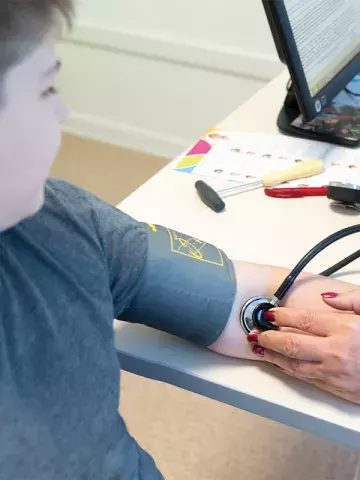Childhood hypertension linked with long-term adverse cardiovascular outcomes
By Rebecca Jenkins
Children with hypertension have a higher long-term risk of major adverse cardiac events compared with children without the condition, a large study finds.
Writing in JAMA Paediatrics, Canadian researchers said that 6% of children worldwide had hypertension and there had been fivefold increase in prevalence in the past three decades. They said it was known that childhood hypertension tracked into adulthood and was associated with subclinical cardiovascular disease, but there was a lack of evidence linking childhood hypertension to cardiovascular outcomes.
In the population-based, retrospective, matched cohort study, researchers compared the rate of major adverse cardiac events among 25,605 youth (median age, 15 years) diagnosed with hypertension with 128,025 matched controls.
The primary outcome of major adverse cardiac events was a composite of cardiovascular death, stroke, hospitalisation for myocardial infarction or unstable angina, or coronary intervention.
Median follow up was 13.6 years overall in the matched cohort and median age at last follow up was 27 years in both the hypertension cohort and the control group.
Those with hypertension had a 2.1-times higher associated risk of major adverse cardiac events over the follow-up period, researchers found.
‘Youth with hypertension had 2- to 3-times higher associated risk of stroke, hospitalised myocardial infarction or unstable angina, and congestive heart failure but not cardiovascular death,’ the researchers wrote.
They said currently most children did not undergo regular blood pressure screening, adding that more than three-quarters with hypertension were undiagnosed and very few were adequately treated.
‘Optimizing the care provided to youth with hypertension may help prevent long-term adult CVD, with substantial health and cost- saving benefits,’ the researchers concluded.
Commenting on the findings, Associate Professor Jonathan Mynard, Senior Research Fellow in heart research at the Murdoch Children’s Research Institute (MCRI) in Melbourne, said it was well-established that some children had high blood pressure, but there had been continuing debate over whether clinicians should intervene.
‘This study adds to a growing body of evidence that all points in one direction: hypertension in childhood is associated with substantially increased risk of cardiovascular disease in adulthood,’ he told Medicine Today.
‘Hypertension and cardiovascular disease events don’t only occur in older people. Tragically, all the events reported in this study occurred between 27 and 34 years of age.’
Professor Mynard said BPOzKids, Hypertension Australia and the MCRI had collaborated to develop the first Australian guideline for the detection and management of high blood pressure in children and adolescents, which was expected to be launched next year.
Although the Australian advice was still in development, Professor Mynard noted clinical guidelines from other regions all recommended screening for high blood pressure in children to uncover a potential trajectory towards cardiovascular disease.
‘Once detected, steps can be taken to lower blood pressure and thereby reduce risk, including increasing physical activity levels, reducing sedentary time, improving diet and, in some cases, starting medication,’ he said.


